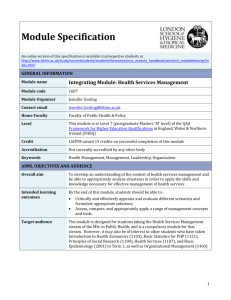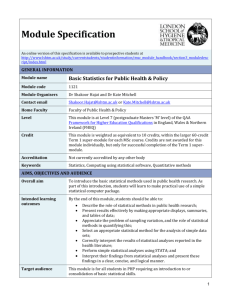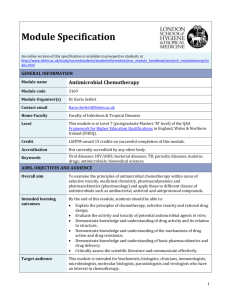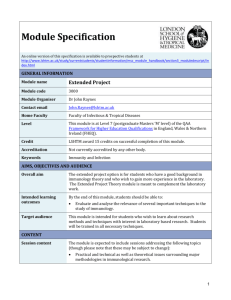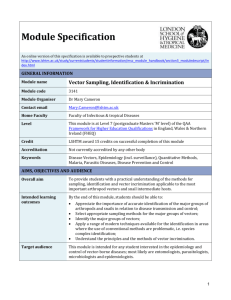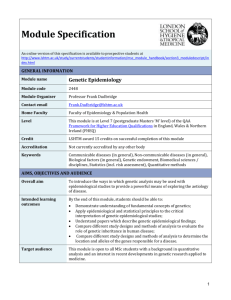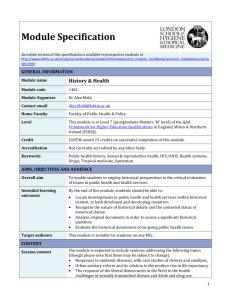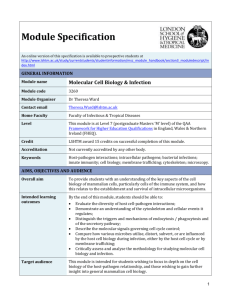3192 Control of Sexually Transmitted Infections Module Specification
advertisement
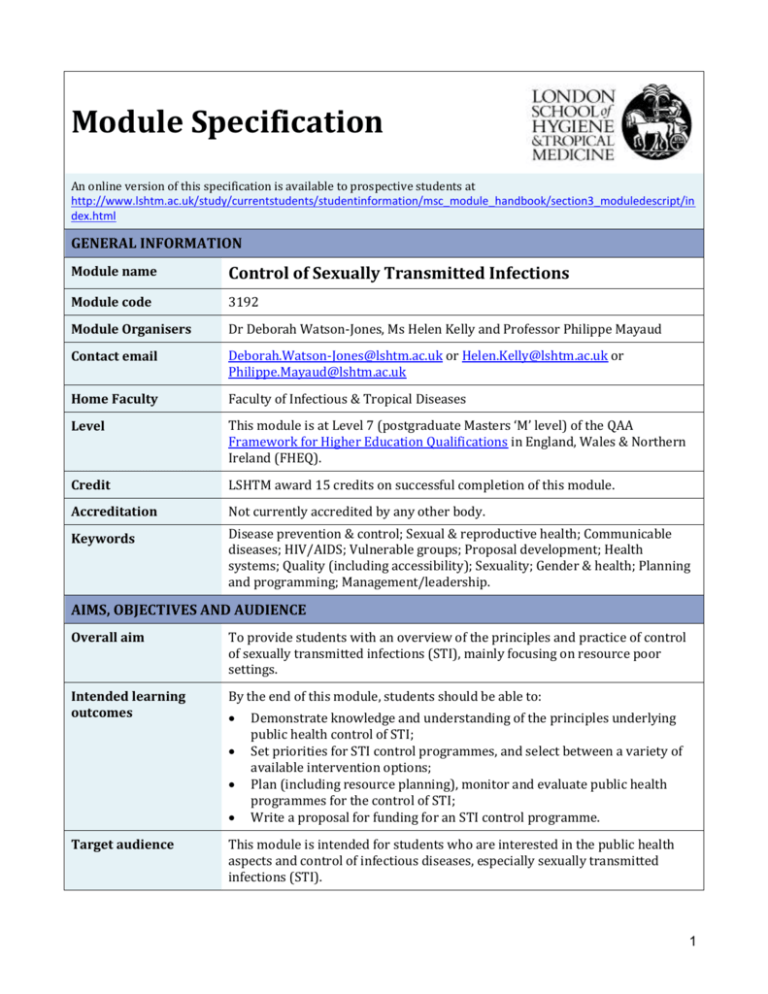
Module Specification An online version of this specification is available to prospective students at http://www.lshtm.ac.uk/study/currentstudents/studentinformation/msc_module_handbook/section3_moduledescript/in dex.html GENERAL INFORMATION Module name Control of Sexually Transmitted Infections Module code 3192 Module Organisers Dr Deborah Watson-Jones, Ms Helen Kelly and Professor Philippe Mayaud Contact email Deborah.Watson-Jones@lshtm.ac.uk or Helen.Kelly@lshtm.ac.uk or Philippe.Mayaud@lshtm.ac.uk Home Faculty Faculty of Infectious & Tropical Diseases Level This module is at Level 7 (postgraduate Masters ‘M’ level) of the QAA Framework for Higher Education Qualifications in England, Wales & Northern Ireland (FHEQ). Credit LSHTM award 15 credits on successful completion of this module. Accreditation Not currently accredited by any other body. Keywords Disease prevention & control; Sexual & reproductive health; Communicable diseases; HIV/AIDS; Vulnerable groups; Proposal development; Health systems; Quality (including accessibility); Sexuality; Gender & health; Planning and programming; Management/leadership. AIMS, OBJECTIVES AND AUDIENCE Overall aim To provide students with an overview of the principles and practice of control of sexually transmitted infections (STI), mainly focusing on resource poor settings. Intended learning outcomes By the end of this module, students should be able to: Target audience Demonstrate knowledge and understanding of the principles underlying public health control of STI; Set priorities for STI control programmes, and select between a variety of available intervention options; Plan (including resource planning), monitor and evaluate public health programmes for the control of STI; Write a proposal for funding for an STI control programme. This module is intended for students who are interested in the public health aspects and control of infectious diseases, especially sexually transmitted infections (STI). 1 CONTENT Session content The module is expected to include sessions addressing the following topics (though please note that these may be subject to change): Models of STI control; Policy and politics and the control of STI; Understanding sexual behaviour; Clinical presentation of STIs; Clinical management in resource poor settings; Partner notification; Role of the laboratory; Surveillance of STIs; Interventions with specific groups (e.g. female sex workers, MSM, youth...); Approaches to the control of specific STIs: HPV, HSV, syphilis...; Successes and failures in the control of STI epidemics; Novel sexual health technologies; Planning, monitoring and evaluation; Indicators for monitoring and project performance; Budgeting for STI programmes; Economic evaluation of STI programmes; Proposal development and presentations; Throughout the course, examples from different settings (geographical, epidemiological, resource-level) will be used to illustrate particular aspects of controlling STI). TEACHING, LEARNING AND ASSESSMENT Study resources provided or required Course handbooks will be provided containing printed lecture outlines + essential reading list, exercises, some published papers; before/at/just after each lecture, lecture notes will be provided (electronically and/or printed). A reading list will be provided to students at the earliest convenience for advance reading. Teaching and learning methods There will be a number of lectures and practical exercises and time will be available for library work. At least one morning or afternoon per week will be devoted to group work. Groups will prepare and present a proposal for a control programme in a resource poor setting at the end of the module. Assessment details Individual and group work to produce a 7000-9000 words/15-20 pages written proposal for an STI control programme, and group presentation of key elements of the proposal. Marks awarded comprise an assessment of specific contributions of individual students to the written proposal (50%), an overall group mark (30%) for the written proposal, marks for the oral group presentation (10%) plus an element of peer assessment (10%). For students who are required to re-sit, or granted a deferral or new attempt, the task will be an individual essay (2,500-3,000 words) on STI control. 2 Assessment dates Assessments will take place on a date TBC when oral presentations will be made. Three copies of the group proposal will have to be handed in the day before. For students who are required to re-sit, or granted a deferral or new attempt, the next assessment deadline will be the standard School-recommended date in mid/late September 2016. Language of study and assessment English (please see ‘English language requirements’ below regarding the standard required for entry). TIMING AND MODE OF STUDY Duration The module runs for 5 weeks at 2.5 days per week; this module runs between Monday morning and Wednesday lunchtime. Dates For 2015-2016, the module will start on Monday 22 February 2016 and finish on Wednesday 23 March 2016. Timetable slot The module runs in LSHTM timetable slot D1 Mode of Study The module is taught face-to-face in London. Both full-time and part-time students follow the same schedule. For full-time students, other LSHTM modules are available in the other half of the week for the C and D slots. Learning time The notional learning time for the module totals 150 hours, consisting of: Contact time ≈ 30 hours Directed self-study ≈ 15 hours Self-directed learning ≈ 20 hours Assessment, review and revision ≈ 85 hours. APPLICATION, ADMISSION AND FEES Pre-requisites This module is open to both clinical and non-clinical students. English language requirements A strong command of the English language is necessary to benefit from studying the module. Applicants whose first language is not English or whose prior university studies have not been conducted wholly in English must fulfil LSHTM’s English language requirements, with an acceptable score in an approved test taken in the two years prior to entry. Applicants may be asked to take a test even if the standard conditions have been met. Student numbers Student numbers have typically been about 10-40 per year; numbers may be capped due to limitations in facilities or staffing. Student selection Preference will be given to LSHTM MSc students and LSHTM research degree students. Other applicants meeting the entry criteria will usually be offered a place in the order applications are received, until any cap on numbers is reached. Applicants may be placed on a waiting list and given priority the next time the module is run. Full registration (full participation) by LSHTM research degree students is required for this module. 3 Fees For registered LSHTM MSc students, fees for the module are included within MSc fees (given on individual course prospectus pages). If registering specifically for this module, as a stand-alone short course, individual module fees will apply. Tuition fees must be paid in full before commencing the module, or by any fee deadline set by the Registry. Scholarships Scholarships are not available for individual modules. Some potential sources of funding are detailed on the LSHTM website. Admission deadlines For 2015-2016: For registered LSHTM MSc students, the module choice deadline (for Term 2 and 3 modules) is Friday 20 November 2015. If registering specifically for this module, applications may be made at any time; but as places are limited, applications ahead of the MSc deadline are strongly advised. All applications should be submitted at the latest 8 weeks prior to the start of the module. Formal registration will take place on the morning of the first day of the module. ABOUT THIS DOCUMENT This module specification applies for the academic year 2015-2016 Last revised 4 July 2014 by Helen Kelly, Deborah Watson-Jones & Philippe Mayaud Minor amendments SDB 20th July 15 London School of Hygiene & Tropical Medicine, Keppel St., London WC1E 7HT. www.lshtm.ac.uk 4


